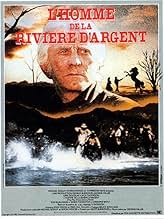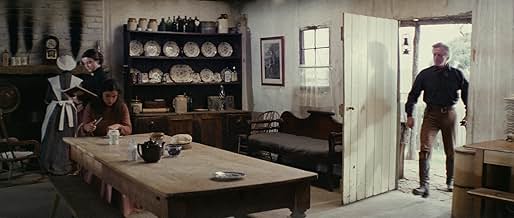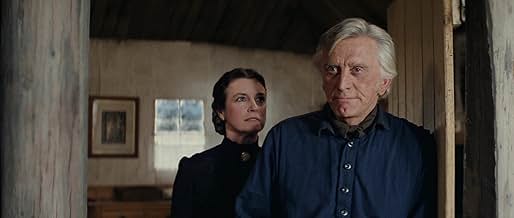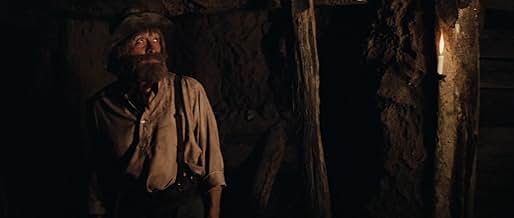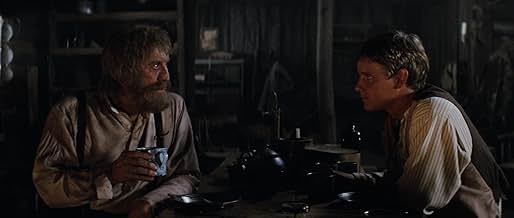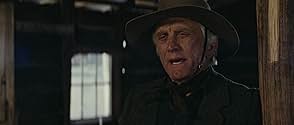AVALIAÇÃO DA IMDb
7,2/10
11 mil
SUA AVALIAÇÃO
Na Austrália de 1880, depois que o pai do jovem Jim Craig morre, ele consegue um emprego na fazenda de gado Harrison, onde é forçado a se tornar um homem.Na Austrália de 1880, depois que o pai do jovem Jim Craig morre, ele consegue um emprego na fazenda de gado Harrison, onde é forçado a se tornar um homem.Na Austrália de 1880, depois que o pai do jovem Jim Craig morre, ele consegue um emprego na fazenda de gado Harrison, onde é forçado a se tornar um homem.
- Direção
- Roteiristas
- Artistas
- Prêmios
- 2 vitórias e 3 indicações no total
- Direção
- Roteiristas
- Elenco e equipe completos
- Produção, bilheteria e muito mais no IMDbPro
Avaliações em destaque
THE MAN FROM SNOWY RIVER ***** An Australian western that centers its story on a coming-of-age mountain man (Tom Burlinson) who's father dies and must go to the lowlands to earn enough money to support the family farm. There, he finds work at a cattle ranch owned by Kirk Douglas, who wants to expand his success to something greater: unmined gold in the mountains. As Burlinson comes to grips with his new work setting and first love (Sigrid Thornton), he evolves into the man he needs to be to follow in his father's footsteps back home. It's excellent family entertainment, with a story that is basic enough for everyone to comprehend, yet doesn't hold a corny or simpleton status because of it. Be sure to rent it.
10mihee
It is hard to believe that so many years has past since I first saw "A Man from Snowy River." I was young and borrowed it on Betamax (yes Betamax) from a friend. Although I wish that I could of seen a full screen version of it, I will have to settle with the still fantastic small screen version.
The story is fairly simple. After his father dies, a boy tries to prove he a man worthy enough to live on his beloved Snowy Mountain. In order achieve this prize, he finds work on lower ground on a big ranch. A sweet romance is set between Jim, the boy, and the Rancher's daughter, Jessica, who is a feisty and strong female. There are wild horses, a sympathetic-but-bad-guy rancher, and beautiful scenery all which are an integral part of the story. (I don't want to give too much of the movie away).
I recently saw this movie (this time on VHS)with my niece and nephew. I could not believe how much I enjoyed it again. The thrilling horse riding scenes kept me at the edge of my seat. It is an ultimate family film one that has no foul language, gratuitous sex or violence. Nothing is dumbed down, the viewers being treated with the respect we deserve. GO RENT IT NOW!
The story is fairly simple. After his father dies, a boy tries to prove he a man worthy enough to live on his beloved Snowy Mountain. In order achieve this prize, he finds work on lower ground on a big ranch. A sweet romance is set between Jim, the boy, and the Rancher's daughter, Jessica, who is a feisty and strong female. There are wild horses, a sympathetic-but-bad-guy rancher, and beautiful scenery all which are an integral part of the story. (I don't want to give too much of the movie away).
I recently saw this movie (this time on VHS)with my niece and nephew. I could not believe how much I enjoyed it again. The thrilling horse riding scenes kept me at the edge of my seat. It is an ultimate family film one that has no foul language, gratuitous sex or violence. Nothing is dumbed down, the viewers being treated with the respect we deserve. GO RENT IT NOW!
Clint Eastwood and Unforgiven be damned. This is by far the best western of the modern era. Its an Aussie tale, but that does not disqualify it in my books. Lonesome Dove has its group as does Unforgiven. But George Miller's The Man from Snowy River is downright majestic.
There are no stagecoaches, revenge killings, poker games or joking jail hands. There isn't even a climactic standoff in a dusty old town. But there is the hand of a maiden to win and inner demons to slay. The climax isn't a shoot out with a band of criminals, but with a stallion and a lonely ride down a rocky mountain.
Director George Miller draws clear characters and honest human situations. He understands what a camera can do. Scenes of great power play out not in a tired miasma of gunfire or hokey soliloquies, but in the striations of muscle from a horse powering through rock in slow motion. George Miler is a poet. And the Man from Snowy River is a story that will stand the test of time. See it.
There are no stagecoaches, revenge killings, poker games or joking jail hands. There isn't even a climactic standoff in a dusty old town. But there is the hand of a maiden to win and inner demons to slay. The climax isn't a shoot out with a band of criminals, but with a stallion and a lonely ride down a rocky mountain.
Director George Miller draws clear characters and honest human situations. He understands what a camera can do. Scenes of great power play out not in a tired miasma of gunfire or hokey soliloquies, but in the striations of muscle from a horse powering through rock in slow motion. George Miler is a poet. And the Man from Snowy River is a story that will stand the test of time. See it.
We often think of the Western as being a characteristically American film genre, although there have been occasional attempts to adapt its conventions to stories set in other parts of the world. "North-West Frontier", for example, is a British film set in British-ruled India, but the plot is essentially that of "Stagecoach". "Untamed" transfers the standard waggon-train plot from the American prairies to the South African veldt, and "The Sundowners", about Australian pioneer life, has similarities to many films set in the Old West. These two latter films, despite their ostensible setting, had an American leading man, Tyrone Power in "Untamed" and Robert Mitchum in "The Sundowners".
"The Man from Snowy River" is another Australian film with a plot which could be that of a Western. (One could call it a "Southern"). It also features a major American star, in this case Kirk Douglas, in a leading role. Or perhaps I should say that it features Kirk Douglas in two leading roles, the brothers Harrison, a wealthy cattle farmer, and Spur, a prospector. The action takes place in Victoria during the 1880s. Apart from the two brothers, the main character is Jim Craig, the "Man from Snowy River" himself. Jim is a young man orphaned by the death of his father in an accident, who goes to work on Harrison's station. The three main strands of the plot concern the relationship between the two brothers, who have been estranged for many years, the growing romance between Jim and Harrison's daughter Jessica, and the efforts to recapture a valuable stallion belonging to Harrison, which has escaped and is running with a herd of wild horses.
There are a number of differences in terminology; the wild horses are referred to as "brumbies" rather than "mustangs", Harrison's landholding is described as a "station" rather than a "ranch" and the reward for the recapture of the stallion is expressed in pounds rather than dollars. With those and a few other exceptions, however, the above synopsis could easily be that of a typical Western. And yet in some ways this is a very Australian film. The title and the story of the hunt for the escaped stallion derive from a narrative poem by the "bush poet" Banjo Paterson, although the other two strands of the plot are the inventions of the scriptwriters. Paterson himself appears as a character, as does Clancy of the Overflow, the hero of another of his poems. Paterson is something of a national icon in Australia, largely because his poetry helped to create the legend of the "Australian bushman", the tough, individualistic inhabitant of the Outback who plays a role in the Australian national imagination similar to that played by the cowboy in the American one. Clancy himself- a real individual, not a fictitious character- has come to be seen as the archetypal bushman.
"The Man from Snowy River" was made in 1982 during a decade when very few traditional Westerns were being made in America itself. (Perhaps the attraction of the film for Douglas was that it gave him a chance to star in one last "Western"). This was, however, a period when the Australian "New Wave" was starting to give that country its own cinematic identity with films about Australian history like "Picnic at Hanging Rock" and "Breaker Morant". This film, therefore, can be seen, not as an attempt to imitate Hollywood, but rather as an attempt to celebrate Australia's own history and culture in the way that the Western celebrated American history and culture. That other great celebration of the bushman, "Crocodile Dundee", a comedy with a contemporary setting, was to come shortly afterwards.
There are no really great acting performances, although Douglas copes well with the challenge of playing two very different characters, the autocratic, patrician Harrison and the more free-spirited Spur, even if his accent does not always hold up. The film is shot against some attractive mountain scenery, and the action sequences, especially the hunt for the missing stallion, are well done. This is a film which will appeal to anyone with an interest in Australia's past, as well to all horse-lovers. 7/10
"The Man from Snowy River" is another Australian film with a plot which could be that of a Western. (One could call it a "Southern"). It also features a major American star, in this case Kirk Douglas, in a leading role. Or perhaps I should say that it features Kirk Douglas in two leading roles, the brothers Harrison, a wealthy cattle farmer, and Spur, a prospector. The action takes place in Victoria during the 1880s. Apart from the two brothers, the main character is Jim Craig, the "Man from Snowy River" himself. Jim is a young man orphaned by the death of his father in an accident, who goes to work on Harrison's station. The three main strands of the plot concern the relationship between the two brothers, who have been estranged for many years, the growing romance between Jim and Harrison's daughter Jessica, and the efforts to recapture a valuable stallion belonging to Harrison, which has escaped and is running with a herd of wild horses.
There are a number of differences in terminology; the wild horses are referred to as "brumbies" rather than "mustangs", Harrison's landholding is described as a "station" rather than a "ranch" and the reward for the recapture of the stallion is expressed in pounds rather than dollars. With those and a few other exceptions, however, the above synopsis could easily be that of a typical Western. And yet in some ways this is a very Australian film. The title and the story of the hunt for the escaped stallion derive from a narrative poem by the "bush poet" Banjo Paterson, although the other two strands of the plot are the inventions of the scriptwriters. Paterson himself appears as a character, as does Clancy of the Overflow, the hero of another of his poems. Paterson is something of a national icon in Australia, largely because his poetry helped to create the legend of the "Australian bushman", the tough, individualistic inhabitant of the Outback who plays a role in the Australian national imagination similar to that played by the cowboy in the American one. Clancy himself- a real individual, not a fictitious character- has come to be seen as the archetypal bushman.
"The Man from Snowy River" was made in 1982 during a decade when very few traditional Westerns were being made in America itself. (Perhaps the attraction of the film for Douglas was that it gave him a chance to star in one last "Western"). This was, however, a period when the Australian "New Wave" was starting to give that country its own cinematic identity with films about Australian history like "Picnic at Hanging Rock" and "Breaker Morant". This film, therefore, can be seen, not as an attempt to imitate Hollywood, but rather as an attempt to celebrate Australia's own history and culture in the way that the Western celebrated American history and culture. That other great celebration of the bushman, "Crocodile Dundee", a comedy with a contemporary setting, was to come shortly afterwards.
There are no really great acting performances, although Douglas copes well with the challenge of playing two very different characters, the autocratic, patrician Harrison and the more free-spirited Spur, even if his accent does not always hold up. The film is shot against some attractive mountain scenery, and the action sequences, especially the hunt for the missing stallion, are well done. This is a film which will appeal to anyone with an interest in Australia's past, as well to all horse-lovers. 7/10
I must confess that I watched this film because I am a Kirk Douglas fan and I certainly was not disappointed in the dual performance he gives as two brothers, one an owner of the Australian equivalent of the Ponderosa and his hermit brother who lives up in the mountains among the wild horses and befriends young Tom Burlinson who becomes the man from Snowy River.
The film is a dramatization of a wild horse roundup such as you would have seen in the American West although American fans might be first thrown by use of the Aussie term 'brumbies'. What the origin of that idiom is I don't know, but for us Yanks just think 'mustang' and it will all become clear.
In fact I just finished a book on Australian general Sir Thomas Blamey and it is mentioned that during his boyhood in Wagga Wagga, he broke and rode 'brumbies.'
And of course the title and part of the plot is based on A.B. "Banjo" Patterson's poem. Patterson himself appears as a passing character in the film and presumably he was inspired by the incidents to write that poem.
Patterson for Australians is sort of a combination of Bret Harte and Mark Twain for Americans. That poem has a nice style and hopefully the poem The Man From Snowy River will be come as known in the western world at large as say Tennyson's Charge of the Light Brigade or Kipling's Gunga Din. In fact like in this film, Rudyard Kipling appears as a passing character in George Stevens's Gunga Din and fulfilled the same function there.
If the Australians felt they needed someone with the international star status of Kirk Douglas to open up the foreign market for this film, all well and good. I just hope Kirk's presence in the film did just that for this fine piece of entertainment.
And this review is dedicated to a couple Australian bull riders from the Professional Bull Riders whom I happened to meet, champions from the land down under, Jared Farley and Brendan Clark. No doubt descendants of the men who rode and broke those brumbies back in the day.
The film is a dramatization of a wild horse roundup such as you would have seen in the American West although American fans might be first thrown by use of the Aussie term 'brumbies'. What the origin of that idiom is I don't know, but for us Yanks just think 'mustang' and it will all become clear.
In fact I just finished a book on Australian general Sir Thomas Blamey and it is mentioned that during his boyhood in Wagga Wagga, he broke and rode 'brumbies.'
And of course the title and part of the plot is based on A.B. "Banjo" Patterson's poem. Patterson himself appears as a passing character in the film and presumably he was inspired by the incidents to write that poem.
Patterson for Australians is sort of a combination of Bret Harte and Mark Twain for Americans. That poem has a nice style and hopefully the poem The Man From Snowy River will be come as known in the western world at large as say Tennyson's Charge of the Light Brigade or Kipling's Gunga Din. In fact like in this film, Rudyard Kipling appears as a passing character in George Stevens's Gunga Din and fulfilled the same function there.
If the Australians felt they needed someone with the international star status of Kirk Douglas to open up the foreign market for this film, all well and good. I just hope Kirk's presence in the film did just that for this fine piece of entertainment.
And this review is dedicated to a couple Australian bull riders from the Professional Bull Riders whom I happened to meet, champions from the land down under, Jared Farley and Brendan Clark. No doubt descendants of the men who rode and broke those brumbies back in the day.
Você sabia?
- CuriosidadesTom Burlinson had never ridden horses much before making this movie and when he took Denny over the cliff to go after the brumbies that was a one-take shot at full gallop down the cliff face.
- Erros de gravaçãoAt the end of the film when the brumbies are being driven toward a holding corral, the mare Bess and the colt are way out in front. They're domesticated, and they'd know that the ranch meant food and water, so they'd be more eager to return than the others.
- Cenas durante ou pós-créditosA herd of wild horses stampede over the hills after the end credits.
- Versões alternativasNBC edited 8 minutes from this film for its 1987 network television premiere.
- ConexõesEdited into Terror Nullius (2018)
Principais escolhas
Faça login para avaliar e ver a lista de recomendações personalizadas
Detalhes
- Data de lançamento
- País de origem
- Idioma
- Também conhecido como
- Herencia de un valiente
- Locações de filme
- Empresas de produção
- Consulte mais créditos da empresa na IMDbPro
Bilheteria
- Orçamento
- US$ 3.500.000 (estimativa)
- Faturamento bruto nos EUA e Canadá
- US$ 20.659.423
- Fim de semana de estreia nos EUA e Canadá
- US$ 694.126
- 7 de nov. de 1982
- Faturamento bruto mundial
- US$ 20.708.426
- Tempo de duração1 hora 42 minutos
- Mixagem de som
- Proporção
- 2.35 : 1
Contribua para esta página
Sugerir uma alteração ou adicionar conteúdo ausente

Principal brecha
By what name was Herança de um Valente (1982) officially released in India in English?
Responda

